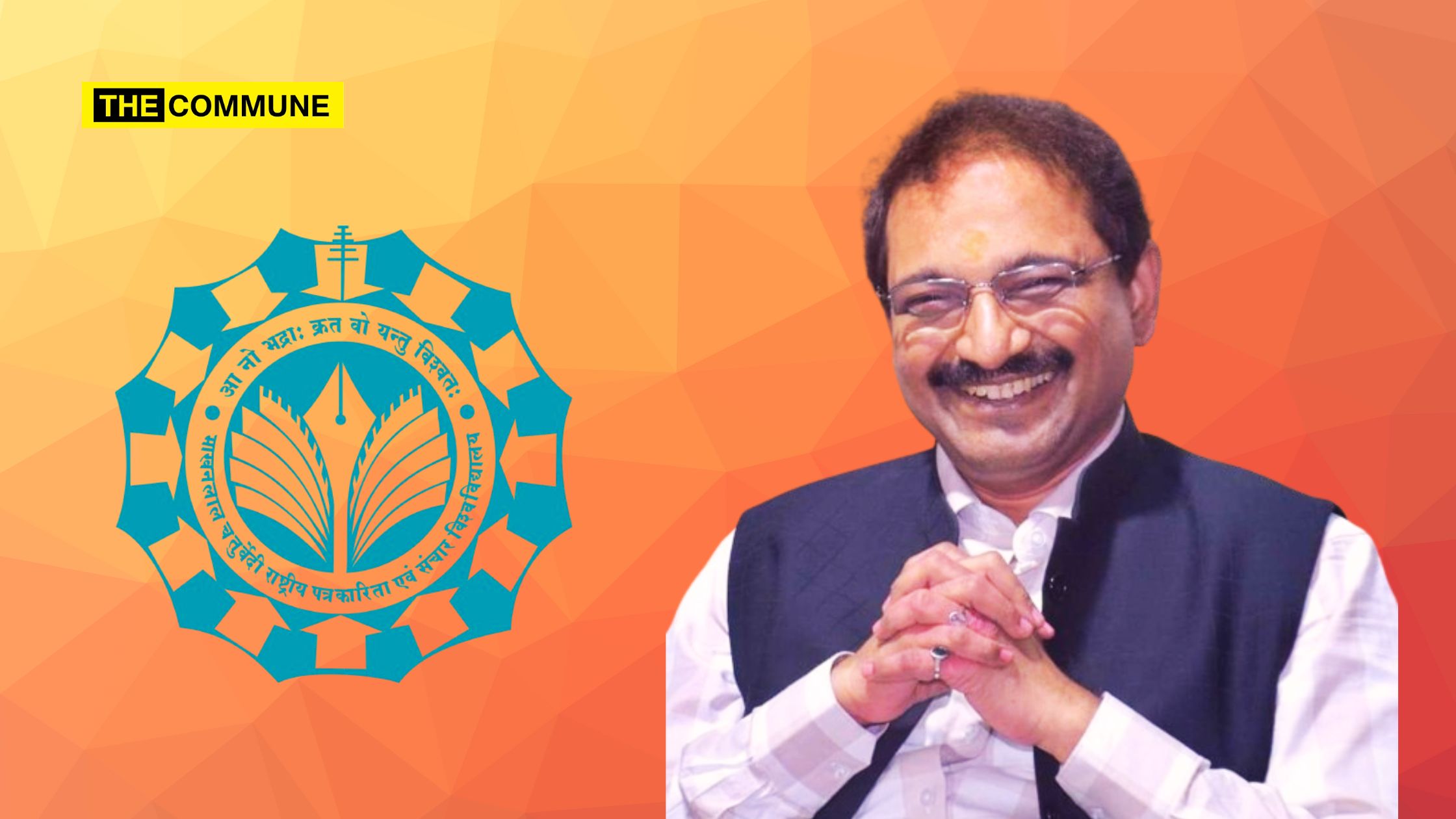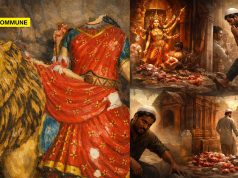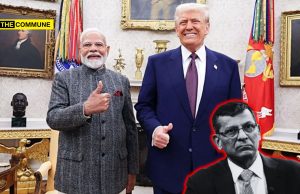
The Commune first met Professor KG Suresh at the Narada Jayanti Awards function in Chennai in June 2024. His smiling demeanour caught everyone’s attention, and his insightful address at the event made it compelling for us to interview him. Prof Suresh’s warm and approachable nature is evident in how he engages with people, whether they are students, colleagues, or interviewers. His work profile will show you how highly qualified Prof. Suresh is and why he deserves to be where he is today.
Professor KG Suresh, the current Vice Chancellor of Makhanlal Chaturvedi National University of Journalism and Communication, India’s largest media university, boasts a career spanning nearly four decades in journalism and media education. We are grateful to him for sharing his journey, his inspirations, and his vision for the future of media education.
Early Inspirations
“I had always wanted to be a journalist since childhood,” Prof. Suresh began nostalgically. “My father was a voracious newspaper reader, and I found myself drawn to the stories and events unfolding in the pages. I pursued my degree in English Literature at Delhi University. I started writing letters to the editor, further cementing my interest in the profession.”
Prof. Suresh’s passion for journalism was not driven by the influence of famous editors or journalists but by the everyday reporters whose investigative stories and socially relevant reporting brought about change. “Journalism, at its core, is about bringing behavioural, societal, and attitudinal changes,” he asserts.
Rising Through the Ranks
Starting as a city crime reporter in Delhi, Prof.Suresh’s career took him through various pivotal roles. As the chief political correspondent at Press Trust of India, he covered the Prime Minister’s Office and the President’s Office. Later, he served as the Senior Consulting Editor with Doordarshan News. His transition into academia began in 1998 when he started teaching at the Indian Institute of Mass Communication (IIMC) as a visiting faculty member.
“I found a lot of positive responses from the students who wanted to understand the practical aspects of journalism rather than just the theoretical,” he recalls. “My classes would have 100% attendance, which was encouraging.”
Accomplishments and Awards
A recipient of the prestigious Ganesh Shankar Vidyarthi Award, Prof. Suresh has been instrumental in expanding media education in India, implementing the National Education Policy 2020, instrumental in obtaining Deemed University Status for IIMC and establishing four new campuses, and fostering community engagement through initiatives like Radio Karmaveer. His expertise is widely recognised, as evidenced by his participation in numerous expert panels, academic councils, and award juries.
As the Founder and President of the Global Media Education Council, he continues to shape the future of media education both in India and internationally. He completed an Experiential Course in Public Health Communication from the University of Oxford, UK. He is also a member of the University Grants Commission Expert Panel and on the Academic Councils of several universities. Additionally, Prof Suresh was a jury member for prestigious awards, including the UNAOC National Film Awards, Ramnath Goenka Awards for Excellence in Media, and the Election Commission of India awards.
Challenges in Modern Journalism
As our conversation turned to journalism’s evolution over the past four decades, Prof. Suresh highlighted two significant challenges today: Corporatization and a Credibility Crisis. He said, “Journalism used to be a mission, especially during the independence struggle. Now, it has become commercialised and corporatised.”
“Profit has taken precedence, and integrity often goes for a toss. The Fourth Estate used to be very credible. The media’s credibility has suffered, with people doubting the veracity of reports and attributing biases to various publications.”
Prof. Suresh emphasised the importance of fact-based reporting. “Truth is a perspective, but facts are immutable. Journalism should focus on reporting facts, allowing the audience to form their own opinions.”
Embracing Indian Knowledge Systems
Under Prof. Suresh’s leadership, Makhanlal Chaturvedi National University of Journalism and Communication has taken significant steps to integrate Indian knowledge systems (IKS) into its curriculum. “We are incorporating IKS into all our programs, from communication theories to practical applications,” he says. “We want our students to be globally exposed but locally rooted.”
He describes various initiatives such as the Bharat Muni Shodh Peeth (chair), the establishment of the Devarishi Narad Indian Knowledge System division in the university’s library, which is the largest media library in India with over 45,000 books, the creation of an IKS Task Force, including Bharatiya festivals like Guru Purnima, Narada Jayanti, Nava Varsha Pratipada in the academic calendar, and dedicated PhD seats for research in IKS. He added, “IKS cannot be established by rhetoric. It has to be established through in-depth, thorough research. We aim to generate substantive literature on IKS through in-depth research, moving beyond rhetoric to create a solid foundation for Indian communication models. Additionally, the university’s Media Mimansa research now includes dedicated articles on IKS research.”
Adapting to Technological Changes
With the advent of AI and other technologies, Prof. Suresh is optimistic about the future. “Any technology is welcome. You cannot run away from it. AI is a tool that can make our tasks easier, but it cannot replace human intelligence and emotions,” he asserts. “The nature of jobs will change, but new opportunities will arise. We need to adapt and embrace these changes,” he further added.
Why Choose Makhanlal Chaturvedi University?
As our conversation drew to a close, when asked why students should choose Makhanlal Chaturvedi University, Prof. Suresh listed several compelling reasons he had for prospective students considering a career in journalism. With enthusiasm in his voice, he enumerated Makhanlal University’s unique offerings. “We offer a wide variety of programs under one roof with reasonable fees, state-of-the-art infrastructure, and a beautiful, eco-friendly campus in Bhopal. Our interdisciplinary approach allows students to interact with experts from various fields, enhancing their learning experience.”
For our readers’ understanding, it is noteworthy that Makhanlal Chaturvedi Rashtriya Patrakarita Vishwavidyalaya, Bhopal (Makhanlal Chaturvedi National University of Journalism and Communication) is India’s and Asia’s first and most prominent media university offering over 28 programs. Since it is a government university, the fees are affordable.
The university, set up in 1990, boasts state-of-the-art infrastructure on a 50-acre campus with students from 23 states. It offers bilingual instruction with a dedicated English journalism programme. It is named after the renowned freedom fighter and journalist Makhanlal Chaturvedi. The university has various journalism, mass communication, computer applications, and media management programs. It has campuses in Bhopal, Rewa, and Khandwa.
Message to Aspiring Journalists
He encourages aspiring journalists to follow their passion. “Media is a platform to express yourself and facilitate positive societal change. It offers respect and recognition. Whether hardcore journalism, public relations, cinema, or event management, media provides a unique space to showcase your talent and make a difference.
To conclude, Prof. Suresh’s journey from a passionate young journalist to a revered academic leader is inspiring. It is also a testament to his dedication to the profession. His efforts to blend traditional Indian knowledge with modern media practices are paving the way for a new generation of journalists who are globally aware and locally grounded.
Subscribe to our channels on Telegram, WhatsApp, and Instagram and get the best stories of the day delivered to you personally.




